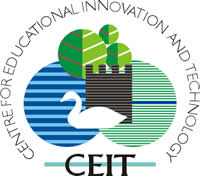 Come
and see us on Stand S97 Grand Hall Gallery
Come
and see us on Stand S97 Grand Hall Gallery
BETT08 |BETT07 | BETT Seminars | BETT Meetings | Highlights from BETT06
Innovative Models for ICT Teacher Training:
The MirandaNet Academy at Bath Spa University
Christina Preston
MirandaNet is now offering ICT courses for teachers, which provide model of CPD through participation in internet supported communities of practice. The innovative university accreditation system offers a flexible assessment mode commensurate to the nature of this type of professional learning task. Teachers are therefore experiencing in their own learning the same kind of independent and transformational learning that the UK government advocate for pupils.
The community that the moderator and eight students established amongst themselves on the course is part of a larger MirandaNet community, as the course itself is part of a larger developmental sequence. This course is also an exercise in collaborative CPD through community supported action research in which the students all develop and research their own e-learning projects, focusing on the needs of supply teachers as a form of authentic work-based enquiry. It was made possible by the previous development of e-facilitators within the MirandaNet community and this will expand outwards as more e-facilitators are trained through the series of courses. It is more than a course, but also a participation in real-time transformation of the CPD environment for supply teachers. This was paralleled by the inclusion of a Teacher Training Agency (TTA) supported and recognised accreditation system recently developed and offered by Bath Spa University as part of its new Professional Master’s Programme (PMP). The PMP provides an innovative accreditation structure with 6 modes of assessment (see table 1 below) designed to enable the professional learning of teachers in schools via meaningful recognition and development of in situ professional learning tasks and activities devised by teachers as part of their work-based action enquiry projects (Coombs, Murphy & Penny, 2003).
| Assessment Mode | Equivalent Evidences (minimum per 15 credits) |
| Dissertation/Essays/Literature Review | 2000 words (+/- 10%). (Include abstracts, tables/templates of reflective analysis etc.) |
| Project Reports/Case Studies | 1000 words (+/- 10%), appendices source material. |
| Submitted Journal Article | Journal/e-Journal receipt, 1000+ words. |
| Accreditation of Professional Development Learning (APDL) and APEL portfolios. | 1000 words (+/- 10%) reflective commentary plus appendices source material submitted as a CPD portfolio. Self-assessment statement/analysis of M-Level evidences. |
| Peer-reviewed seminars and professional meetings/conferences. | 1000 words (+/- 10%) seminar/conference paper, appendices to include additional handouts, acetates and/or PowerPoint presentations used. Self-assessment statement/analysis of M-Level evidences. |
| Design & Evaluation of instructional resources and/or artefacts, including models, posters, ICT, Videoclips etc. | 500 words (+/- 10%) reflective commentary plus appendices of: design/evaluation templates used; literature sources analysed; presentation materials; and, exhibits of instructional materials and/or artefacts developed submitted as a CPD portfolio. Self-assessment statement/analysis of M-Level evidences. |
Table 1: The CPD professional learning modes of assessment offered at Bath Spa University towards the range of postgraduate awards up to Master’s level.
(http://www.bathspa.ac.uk/schools/education/cpd/).
Such applied teaching projects are thus accredited and developed via the Bath Spa University Work-based Action Enquiry CPD module that leads to a Postgraduate Certificate in Professional Learning with career emphasis in Learning and Knowledge Technology. The results have been measurably good so far. In the first course in 2004, all the participants successfully completed the course as well as successfully e-facilitating online education discussion forums. 75% undertook an independent research project to achieve a Postgraduate Certificate in Learning & Knowledge Technology. Half of the course members now lead professional development seminars for supply and in-service teachers.
The MirandaNet CPD model developed through these courses has now been applied in several international contexts, which includes Free State, South Africa, where the community is called Elapa, the Czech Miranda and Fryslan Learning Network in the Netherlands. Companies who are currently partnering practice-based research projects, seminars and workshops include Aston Swann, Inspiration, Promethean, Microsoft, Oracle, Sherston, 2Simple and TAG. Through the support of these commercial partners Fellows are able to support new web-based communities, which take relevant thinking and traditions from the MirandaNet model, but which also develop their own local traditions and work in the local language. In this way it is intended that the international MirandaNet will also be enriched and renewed by the feedback of new ideas from other learning cultures.
BETT Contact details
- Stand S97 Grand Hall Gallery
- Christina Preston: 07 8 01 336 048
- Maria Causon
[Back]

